Politics
Musk and Ronaldo attend Trump’s dinner with Saudi crown prince
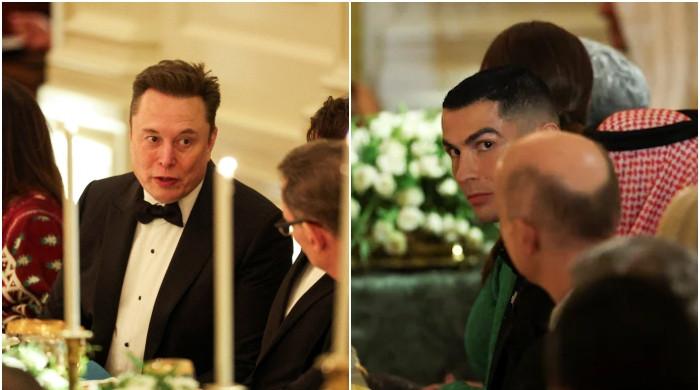
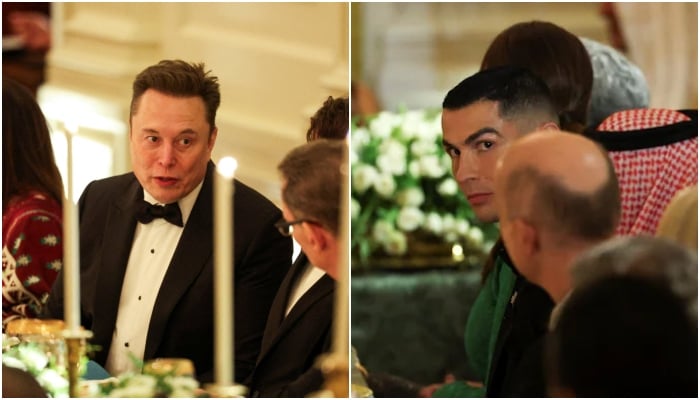
WASHINGTON: Billionaire Elon Musk and Portuguese soccer superstar Cristiano Ronaldo were among the guests at a lavish White House dinner hosted by US President Donald Trump for the visiting Saudi crown prince on Tuesday.
Ronaldo plays for Saudi club Al Nassr, one of a number of ageing players who have been attracted to the desert kingdom’s heavy spending on stars despite its rights record.
The 40-year-old, whose contract with the Saudi club ends this summer, took his place near the head of Trump’s table a few seconds before the president and Saudi Crown Prince Mohammed Bin Salman entered.
“You know, my son is a big fan of Ronaldo,” Trump said in his pre-dinner speech, adding that his soccer-mad son Barron, 19, got to meet the legendary player.
“I think he respects his father a little bit more now, just the fact that I introduced you.”
Ronaldo was not the only soccer-related dinner guest, as FIFA chief Gianni Infantino made yet another appearance at the White House ahead of the 2026 World Cup, which the United States is co-hosting.
Ronaldo says next year’s World Cup — for which Portugal booked their place on Sunday — will “definitely” be his last.
Also at the black-tie dinner was Space X and Tesla tycoon Musk, in a sign that the rift between the president and the world’s richest man has healed after their fiery public divorce.
South African-born Musk spent five months as head of the cost-cutting Department of Government Efficiency (Doge) and accompanied Trump on a trip to Saudi Arabia in May.
But the relationship collapsed in July after Musk criticised Trump’s so-called “big, beautiful” spending bill and then said that the president was in investigatory files relating to the late sex offender Jeffrey Epstein.
Trump responded by threatening Musk with deportation.
Musk, wearing a tuxedo, was seen chatting to fellow guests at a candlelit table — although a different one from Trump’s.
Politics
EU Diplomat Supports Pakistan’s Call for Taliban to Stop Backing TTP
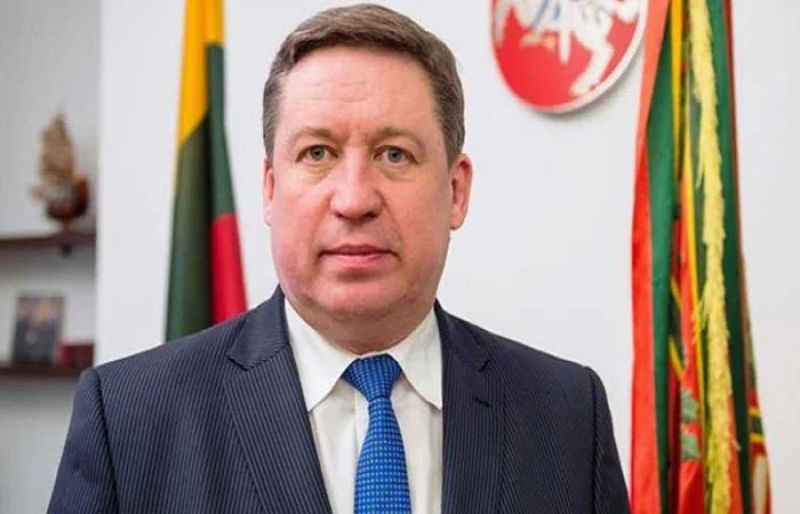
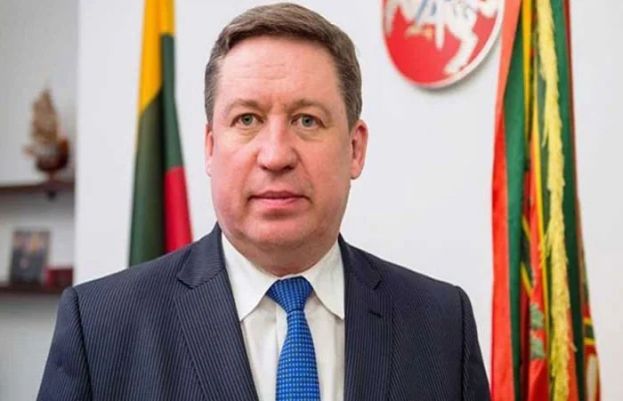
The European Union’s ambassador to Pakistan has expressed support for Islamabad’s position that militants based in Afghanistan are behind recent attacks in the country, while emphasizing that Pakistan must align its security expectations with tangible progress on human rights and democratic norms.
Newly appointed Ambassador Raimundas Karoblis said Pakistan’s call for the Taliban to prevent the Tehreek-e-Taliban Pakistan (TTP) from operating on Afghan soil is “legitimate” and linked to genuine security concerns.
“We condemn terrorism in all its forms,” he noted, adding that Pakistan’s expectations from Afghanistan regarding action against the TTP are justified.
At the same time, Karoblis stressed that the EU is urging Islamabad to maintain diplomatic channels, highlighting Turkiye’s ongoing mediation efforts between the two sides.
When asked whether the Taliban were honoring their Doha pledge not to allow Afghan soil to be used against neighboring countries, he said he lacked independent intelligence to make a judgment. “It is too early to reach a definitive conclusion,” he added.
The ambassador confirmed that a high-level Pakistan-EU Strategic Dialogue will take place in the coming weeks, led by EU foreign policy chief Kaja Kallas and Deputy Prime Minister Ishaq Dar.
The discussions will cover Afghanistan, the Russia-Ukraine war, regional security, and Pakistan’s role at the UN, while other issues such as trade, migration, and counterterrorism will be addressed in separate forums.
The dialogue comes as Pakistan seeks to maintain its preferential trade status under the GSP Plus programme, which grants duty-free access to European markets in exchange for compliance with international human rights treaties.
Enforced disappearances, long reported in Balochistan but now increasingly documented in Punjab and Sindh, will also be among the EU’s “top priorities” in its monitoring review.
The envoy noted that the EU will evaluate the performance of Pakistan’s Commission of Inquiry on Enforced Disappearances during the upcoming assessments.
When asked about Pakistan’s last two elections, both widely criticized by opposition parties, Karoblis did not label them illegitimate but acknowledged that significant issues had occurred.
“No system is perfect, but irregularities must be addressed so they are not repeated”, he said. The EU recognised the current parliament and government, he added, but concerns about electoral transparency remain on its radar.
Karoblis similarly declined to endorse or condemn recent constitutional amendments affecting judicial powers, though he noted that Brussels was listening to critics. Compliance with UN conventions, he said, was the key test the EU would apply.
Replying to a query on Imran Khan’s detention, Karoblis refused to enter the debate. “I may have personal views, but this is a matter for Pakistan’s judicial authorities”, he said. “Political pluralism is important, but it must be discussed through the rule of law”.
Karoblis said the EU and its member states have mobilised nearly one billion euros in assistance following Pakistan’s devastating 2022 floods, including an initial one million euro tranche for emergency relief.
Under the EU’s Global Gateway strategy, climate adaptation will remain a priority sector for future cooperation.
Politics
Air India lobbying to use Chinese airspace amid mounting financial woes due to Pakistan ban
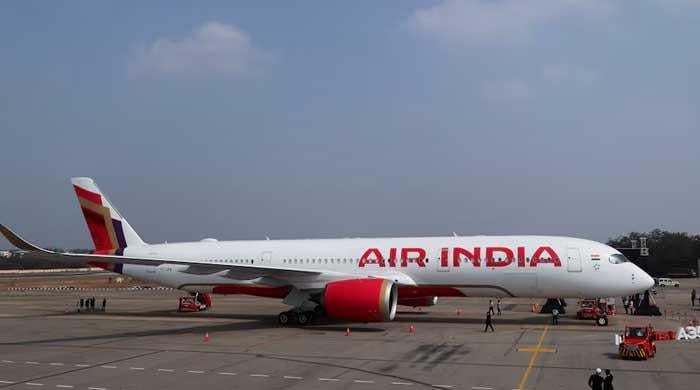
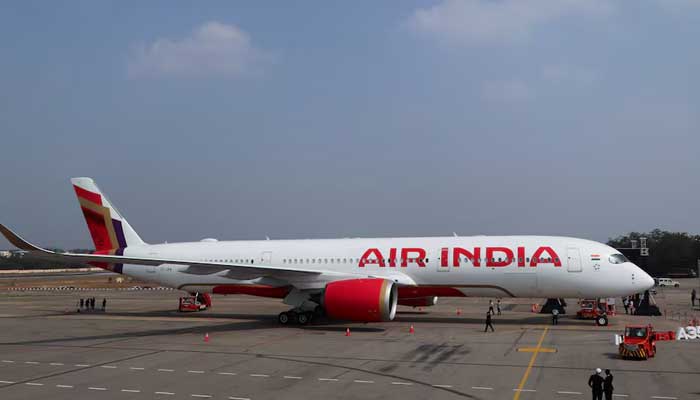
- Pakistani airspace closure costing Air India profit $455m annually.
- Passengers shifting to foreign carriers due to shorter flight time.
- India reviewing plea to diplomatically ask China for alternate route.
NEW DELHI/HONG KONG: Air India is lobbying the Indian government to convince China to let it use a sensitive military airspace zone in Xinjiang to shorten routes as the financial toll from a ban on Indian carriers flying over Pakistan mounts, a company document shows.
The unusual request comes just weeks after direct India-China flights resumed after a five-year hiatus following a Himalayan border clash between the nations.
Air India has been seeking to rebuild its reputation and international network after a London-bound Boeing Dreamliner crashed in Gujarat in June, killing 260 people and forcing it to briefly cut flights for safety checks.
But that effort is being complicated by the closure of Pakistan’s airspace to Indian carriers since their diplomatic tensions erupted in late April.
For Air India, the country’s only carrier with a major international network, fuel costs have risen by as much as 29% and journey times by up to three hours on some long-haul routes, according to the previously unreported document submitted to Indian officials in late October and reviewed by Reuters.
The Indian government is reviewing Air India’s plea to diplomatically ask China to allow an alternative routing and emergency access to airports in case of diversions at Hotan, Kashgar and Urumqi in Xinjiang, aiming to reach US, Canada and Europe faster, the document said.
“Air India’s long-haul network is under severe operational and financial strain […] Securing Hotan route will be a strategic option,” it added.
The airline, owned by Tata Group and Singapore Airlines estimated the Pakistan airspace closure’s impact on its profit before tax at $455 million annually — a significant amount given its fiscal 2024-25 loss stood at $439 million.
The Chinese foreign ministry said it was not aware of the situation and referred Reuters to the “relevant authorities”.
Air India and civil aviation authorities in India, China and Pakistan did not respond to Reuters‘ queries.
‘Nonviable routes’
The Chinese airspace Air India is seeking to access is ringed by some of the world’s highest mountains of 20,000 ft (6,100 m) or more, and is avoided by international airlines due to potential safety risks in case of a decompression incident.
More critically, it also falls within People’s Liberation Army’s Western Theatre Command, which is equipped with extensive missile, drone and air-defence assets and shares some airports with civilian aircraft, military analysts say.
The Pentagon’s December report on China’s military said the command’s responsibilities include responding to any conflict with India.
China’s military has much greater control of the country’s airspace than in most other aviation markets, restricting flight paths. Open-source intelligence tracker Damien Symon said China’s military has recently expanded an airbase at Hotan.
China’s defence ministry did not immediately respond to a request for comment.
Data from AirNav Radar shows no non-Chinese airlines departed or arrived at Hotan airport in the last 12 months.
Shukor Yusof, founder of aviation consultancy Endau Analytics, said: “Air India can try, but it’s doubtful China will accede” to access given the region’s terrain, lack of emergency airports and possibility of security issues.
Airspace globally has been constricted due to proliferating conflict zones.
US carriers have been banned from flying over Russia since the Ukraine war began in 2022 and pulled out of many US-India routes. That gave Air India a near-monopoly on non-stop flights from India.
But after the Pakistan airspace closure, Air India’s Delhi-Washington route was suspended in August. Now other routes are under review, with the direct Mumbai- and Bengaluru to San Francisco routes “becoming unviable” due to an additional three hours of travel time, including a technical stop in Kolkata, the document said.
A flight from San Francisco to Mumbai on Lufthansa via Munich is now only five minutes longer than on Air India.
“Passengers [are] shifting to foreign carriers due to shorter flight time as they have the benefit of Pakistan overflight,” the document said.
Air India estimates the requested Hotan route in China could substantially cut extra fuel requirements and flight times, help restore passenger and cargo capacity it trimmed by as much as 15% on routes like New York- and Vancouver-Delhi, and reduce losses by an estimated $1.13 million per week.
Deepening financial issues
With no signs of airspace ban easing, Air India also wants “temporary subsidy till Pakistan airspace opens”, the document said.
Air India, which has placed $70 billion of aircraft orders, is seeking help resolving legacy tax issues.
India’s government indemnified the airline against claims payable before selling it to Tata in 2022, but several notices have been received related to old tax liabilities of $725 million, raising legal and reputation risks, the document said.
A confidential government notice from March, seen by Reuters, showed tax authorities warned of “coercive steps” — which can include freezing of assets — to recover dues of $58 million in one case.
Contesting such tax demands has led to “additional cashflow burden […] despite assurances during disinvestment”, the airline said.
Politics
Dubai Airshow showcases first-ever night drone display


DUBAI: The second day of the five-day Dubai Airshow concluded late on Tuesday with a spectacular night-time drone display, marking the first extension of show hours in the event’s history.
Organisers extended the programme until 9pm for one night only to stage the special performance.
Hundreds of illuminated drones lit up the Dubai sky, forming shapes of aircraft, rockets, birds and the city’s iconic skyline, drawing applause from visitors.
The display also projected the words “The future is here”, accompanied by music that added to the show’s atmosphere.
The Dubai Airshow continues until Friday.
-

 Tech1 week ago
Tech1 week agoFrom waste to asset: Turning ethanol production CO₂ into jet fuel
-

 Tech4 days ago
Tech4 days agoNew carbon capture method uses water and pressure to remove CO₂ from emissions at half current costs
-
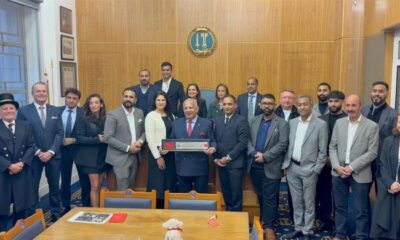
 Politics5 days ago
Politics5 days agoBritish-Pakistani honoured for transforming UK halal meat industry
-

 Sports4 days ago
Sports4 days agoTexas A&M officer scolds South Carolina wide receiver after touchdown; department speaks out
-
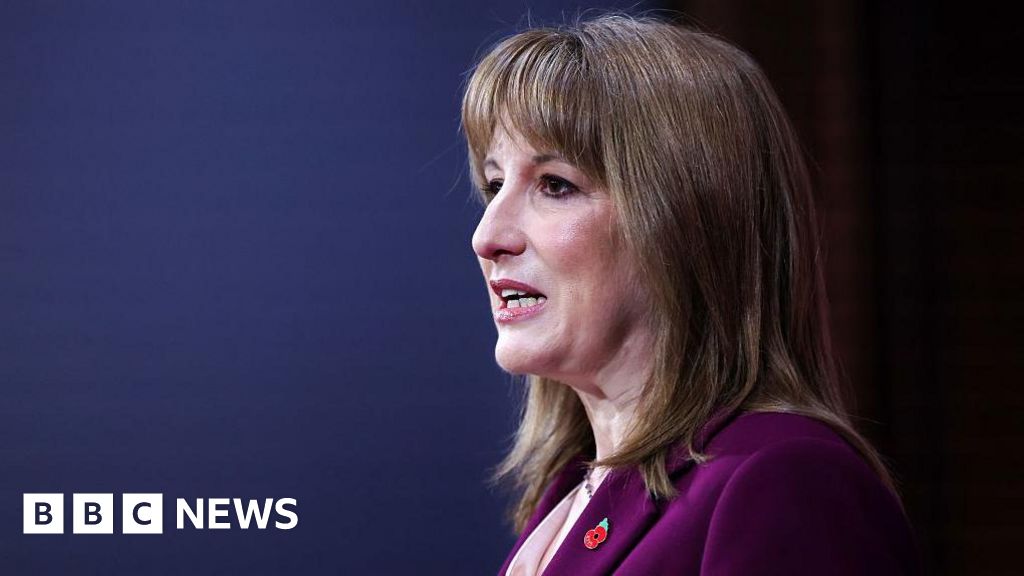
 Business5 days ago
Business5 days agoWhat’s behind Rachel Reeves’s hokey cokey on income tax rises?
-

 Business4 days ago
Business4 days agoThese 9 Common Money Mistakes Are Eating Your Income
-

 Fashion6 days ago
Fashion6 days agoAdidas & Patrick Mahomes expand NIL programme with Texas Tech athletes
-

 Fashion1 week ago
Fashion1 week agoBangladesh garment makers eye $5 bn more in exports post policy tweak






